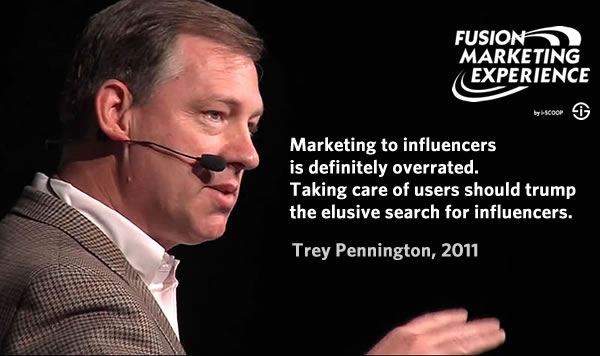
Trey Pennington is a marketing pro, business connector, and storyteller with a passion to help people uncover their hidden treasures and put them to work. He uses social media to connect with audiences around the globe. HubSpot ranks his Facebook profile as one of the most influential in the world and his Twitter profile in the top 0.01%.
Trey helped start ten Social Media Clubs in the US, UK, and Australia and routinely speaks to groups about using social media to make connections and have conversations that lead to commerce. We asked Trey, one of the keynote speakers at the Fusion Marketing Experience 2011, about his views on the role of social media from the overall business and marketing perspective.
Social media: the bigger picture
How and why did you get into social media?
Trey Pennington: Here’s why I do social media (I realize my view is only that, my view; still, it is my view). What drives me is a philosophical worldview:
1) Everyone wants to be heard
2) Everyone wants to be understood
3) Everyone wants his or her life to count
What is your key message at the Fusion Marketing Experience?
Trey Pennington: The explosive growth of social media affords the commercial world unprecedented opportunity. The opportunity is not where people expect it, though.
Many are looking at increasing ROI and profits through efficiency. The real opportunity is more fundamental and we’ll explore it’s unexpected source.
Why do many marketers still fail to integrate social media successfully into their broader marketing strategies? What are they getting wrong and what they should do to get it right?
Trey Pennington: Much of commercial communications comes from established professional disciplines like public relations, advertising, or marketing. Those branches of communication developed over long periods of time, have generations of experienced practitioners, and have developed substantial, documented bodies of knowledge to support their ongoing practice. Social media popped onto the scene from a different source—it bubbled up from kids. The grown ups saw social media as kids’ stuff. Instead of embracing social media and applying disciplined thinking to incorporating the new media into marketing programs, the professionals let social media evangelist develop independent strategies for each emerging platform.
The tide seems to be changing. Now each established discipline seems to be embracing social media and experimenting with it to see how it supports business objectives. I’m hesitant to label the experiments as “right” or “wrong,” however, I do suggest those who see social media as a free broadcast medium will tend to have less fulfilling experiences with it!
Re-examining the purpose of a business
Do you think social media integration is becoming a quality standard of successful company?
Trey Pennington: The opportunity is even more fundamental than integration. Rethinking marketing, starting with re-examining the purpose of a business, is where success begins. The shift is Copernican in its impact. Five hundred years ago the world was shocked to discover Earth was not the center of the universe. Today marketers are awakening to the realization the company is not the center of the commercial universe. Fortunately the soulful wail, ‘but we’ll lose control of the message,’ is rarely heard today. Three years ago, ‘controlling the message’ was a serious concern. Politicians still say over and over again, ‘If we can only get our message out.’ I predict within one or two more election cycles, those relics will be replaced with people who embrace the necessity of getting the message in. The real quality standard then will be redrawing the map of the universe and placing the corporation in its proper relation to everything else.

What are your favorite social media campaigns?
Trey Pennington: Interesting category of thought—social media campaigns. It could be just me, but I don’t tend to think of social media in units of campaigns. Social media isn’t something with a beginning and an end; it’s life. One company who has impressed me with their philosophical embrace of social media is Coca-Cola.
Coca-Cola was willing to make a colossal break with their past when they discovered two fans had created an immensely popular Facebook Fan Page for their beloved, well-protected trademark. Instead of launching a bevy of expensive attorneys to take over or shut-down the Page, Coca-Cola invited the Page creators to Atlanta and treated them like royalty. Coca-Cola made sure they addressed all of the creators’ questions and then equipped them to continue their work of advocacy.
Chris Brown took a somewhat similar approach when Kevin and Jill totally violated his copyright for the song Forever. Kevin and Jill played the recording at a public performance (a violation of copyright), made a new recording of the song (another violation of copyright), and then published that bootlegged recording on YouTube (yet another, separately punishable violation of copyright). Instead of forcing YouTube to remove the illegal work, Chris Brown did nothing. As a result, the song experienced a remarkable resurgence, eventually making it to Billboard’s Hot 100 for the entire decade.
Neither example was a “campaign.” Rather both were an visible demonstration of a whole new way of looking at things.
Social media and influence
You currently write a lot about influence, mainly on social media. How would you define an influencer? Do we overrate it?
Trey Pennington: Over 3,000 years ago King Solomon bemoaned the incessant publishing of books. He’d probably think the modern man has gone plumb insane writing unending volumes on topics such as influence. My own writing on the topic is merely an effort to highlight the absurdity of reducing such a complex, multifaceted concept as influence to a two digit or elementary ranking. People search for an absolute and once-and-for-all measure of influence, yet influence is relative and dynamic.

It seems to me companies would be better off to focus on users first and then equip real users with ample social objects so the users could tell their own stories in their own words. It’s much simpler for companies to identify users than influentials. All they have to do is look at their sales records.
Marketing to influencers is definitely overrated. Taking care of users should trump the elusive search for influencers. Users are the one who have a reason to get excited about a brand’s products and services. Influencers tend to just more excited about themselves.
Interview by Giedrius Ivanauskas for the Fusion Marketing Experience magazine, published at the occasion of the first Fusion Marketing Experience conference by i-SCOOP in 2011. Giedrius Ivanauskas is a researcher of social media and augmented reality. He shares his experience and insight about social media at The Social Media Today blog and on his own site, Social Media Citizens. Partially adapted from the interview Giedrius posted here.






